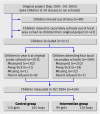Preventing childhood obesity: two year follow-up results from the Christchurch obesity prevention programme in schools (CHOPPS)
- PMID: 17923721
- PMCID: PMC2018766
- DOI: 10.1136/bmj.39342.571806.55
Preventing childhood obesity: two year follow-up results from the Christchurch obesity prevention programme in schools (CHOPPS)
Abstract
Objective: To assess the long term effects of an obesity prevention programme in schools.
Design: Longitudinal results after a cluster randomised controlled trial.
Setting: Schools in southwest England.
Participants: Of the original sample of 644 children aged 7-11, 511 children were tracked and measurements were obtained from 434 children three years after baseline.
Intervention: The intervention was conducted over one school year, with four sessions of focused education promoting a healthy diet and discouraging the consumption of carbonated drinks.
Main outcome measures: Anthropometric measures of height, weight, and waist circumference. Body mass index (BMI) converted to z scores (SD scores) and to centile values with growth reference curves. Waist circumference was also converted to z scores (SD scores).
Results: At three years after baseline the age and sex specific BMI z scores (SD scores) had increased in the control group by 0.10 (SD 0.53) but decreased in the intervention group by -0.01 (SD 0.58), with a mean difference of 0.10 (95% confidence interval -0.00 to 0.21, P=0.06). The prevalence of overweight increased in both the intervention and control group at three years and the significant difference between the groups seen at 12 months was no longer evident. The BMI increased in the control group by 2.14 (SD 1.64) and the intervention group by 1.88 (SD 1.71), with mean difference of 0.26 (-0.07 to 0.58, P= 0.12). The waist circumference increased in both groups after three years with a mean difference of 0.09 (-0.06 to 0.26, P=0.25).
Conclusions: These longitudinal results show that after a simple year long intervention the difference in prevalence of overweight in children seen at 12 months was not sustained at three years.
Conflict of interest statement
Competing interests: DK had a child attending one the schools involved in the original project.
Comment in
-
Preventing childhood obesity: Too early to ditch the campaign.BMJ. 2007 Oct 27;335(7625):841. doi: 10.1136/bmj.39374.433356.BE. BMJ. 2007. PMID: 17962251 Free PMC article. No abstract available.
References
-
- Lobstein T, Baur L, Uauy R. Obesity in children and young people: a crisis in public health. Obes Rev 2004;5:4-85. - PubMed
-
- World Health Organization. Global strategy on diet, physical activity and health: obesity and overweight Geneva: WHO, 2006
-
- Jotangia D, Moody A, Stamatakis E, Wardle H. Obesity among children under 11 London: National Centre for Social Research, 2005
-
- Zaninotto P, Wardle H, Stamatakis E, Mindell J, Head J. Forecasting obesity to 2010 London: National Centre for Social Research/Department of Health, 2006
-
- Story M. School-based approaches for preventing and treating obesity. Int J Obesity 1999;23:43-51. - PubMed
Publication types
MeSH terms
LinkOut - more resources
Full Text Sources
Medical

